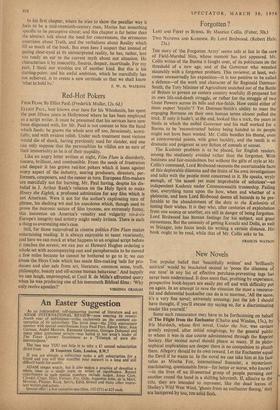Red-Hot Pokers ELLIOT PAUL, best known over here for his
Whodunits, has spent the paSt fifteen years in Hollywood where he has been employed as a script writer. It must he presumed that his services have now been dispensed with, for Mr. Paul is not content to bite the hand which feeds; he gnaws the whole arm off too, ferociously, scorn- fully, and with evident relish. Under such treatment most victims would die of shock, having previously sued for slander, and one can only suppose that the personalities he vilifies are as sure of their immortality as he is of their stupidity. Like an angry letter written at night, Film Flam is disorderly, sincere, brilliant, and combustible. From the seeds of frustration and despair it has grown red-hot pokers which it leans against every aspect of the industry, searing producers, directors, per- formers, composers, and the censor in turn. European film-makers are mercifully not for burning, Mr. Paul having, despite his dis- belief in J. Arthur Rank's reliance on the Holy Spirit to make Henry the Eighth, a profound admiration for any film which is not American. Were it not for the author's captivating turn of phrase, his slashing wit and his anecdotes which, though used to prove the moronic nature of film tycoons, are extremely funny, this insistence on America's venality and vulgarity vis-a-vis Europe's integrity and artistry might easily irritate. There is such a thing as overstating one's case. Still, for those uninvolved in cinema politics Film Flam makes entertaining reading. It is always enjoyable to taunt vicariously, and here we can mock at what happens to an original script before it reaches the screen; we can jeer at Howard Hughes ordering a whole set with accompanying cast and paraphernalia to be moved a few miles because he cannot be bothered to go to it; we can abuse the Hays Code which has made film-making 'safe for pro- ducers and also safe from art, literature, common sense, truth, philosophy, beauty and off-screen human behaviour.' And happily we can laugh, unprompted, at Cecil B. de Mille's affronted query when he was producing one of his mammoth Biblical films: 'Why


































 Previous page
Previous page